

Course Design - Chicago Center for Teaching. Planning a course is arguably the key ingredient in pedagogical success.
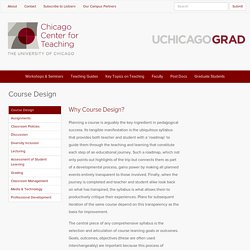
Its tangible manifestation is the ubiquitous syllabus that provides both teacher and student with a ‘roadmap’ to guide them through the teaching and learning that constitute each step of an educational journey. What does research informed teaching look like? Excellent teaching goes hand in hand with excellent research.
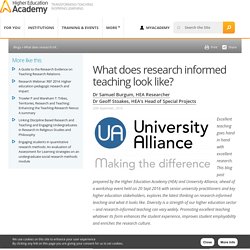
This blog post prepared by the Higher Education Academy (HEA) and University Alliance, ahead of a workshop event held on 20 Sept 2016 with senior university practitioners and key higher education stakeholders, explores the latest thinking on research-informed teaching and what it looks like. Diversity is a strength of our higher education sector – and research-informed teaching can vary widely. Promoting excellent teaching whatever its form enhances the student experience, improves student employability and enriches the research culture. The ballad of the sad instruction librarian. It’s been a busy Fall term so far and I haven’t had much time to spend on Twitter, but I usually check it first thing every morning.
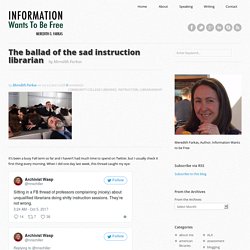
Who gets free speech in the university classroom? Higher education news has been awash in recent months with the comments by the University of Oxford’s Vice Chancellor Louise Richardson: “I’ve had many conversations with students who say they don’t feel comfortable because their professor has expressed views against homosexuality.
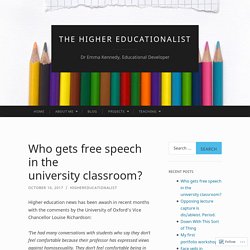
They don’t feel comfortable being in class with someone with those views. “And I say, ‘I’m sorry, but my job isn’t to make you feel comfortable. Education is not about being comfortable. Microlearning – A New Old Concept to Put Out to Pasture. Mirjam Neelen & Paul A.
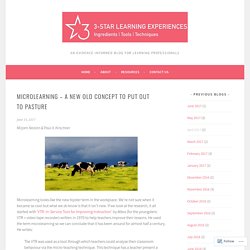
Kirschner. Ten Myths and a Truth from the TEF: Reading the White Paper. Although the Higher Education and Research Bill is still going through parliamentary scrutiny, the Teaching Excellence Framework is about to be implemented and yet we do not know for certain what its effects will be, or even which institutions will enter into it.
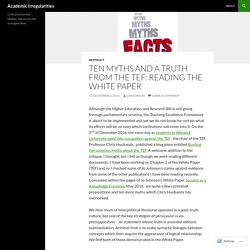
On the 2nd of December 2016, the same day as students at Warwick University went into occupation against the TEF , the chair of the TEF, Professor Chris Husbands, published a blog piece entitled Busting five common myths about the TEF. A welcome addition to the critique, I thought, but I felt as though we were reading different documents. I have been working on Chapter 2 of the White Paper (TEF) and so I checked some of Jo Johnson’s claims against evidence from some of the other publications I have been reading recently.
WHAT ARE ONTOLOGY AND EPISTEMOLOGY? In philosophy, some things stick in your head, and some don't.
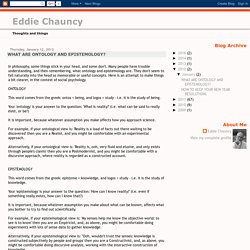
Many people have trouble understanding, and then remembering, what ontology and epistemology are. They don't seem to fall naturally into the head as memorable or useful concepts. For academics with depression, the student feedback process is hell. I find teaching incredibly rewarding, but because of depression and anxiety there is one area where I have particularly struggled: student evaluations.
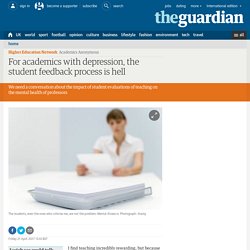
Objectively, my reviews are far from terrible. Objectively, I know that I have glowing evaluations from students. But depression doesn’t let you look at things objectively. Students need a voice, and professors need to reflect on students’ experiences to improve. Fun with flags: how metrics will work in TEF outcomes. Over the last few weeks, universities have been presented with their data and the ‘flags’ – the plusses and minuses, and double plusses and double minuses – which show how well they’re doing relative to a benchmark of performance in the TEF.
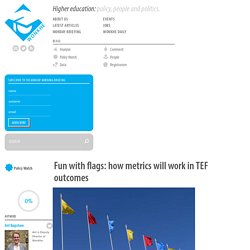
As the metrics and associated flags drive the TEF outcomes, these are important to understanding how the exercise will operate… and the likely results. A little recap Central to the Teaching Excellence Framework is the use of metrics to establish how well higher education providers perform. The metrics data – ideally the previous three years (but less if there’s less information available) – is then benchmarked based on the characteristics of the students at the provider, including factors such as age, ethnicity and subject of study. Each provider has a unique benchmark based on its students’ characteristics. Calling Bullshit — Syllabus. Logistics Course: INFO 198 / BIOL 106B.
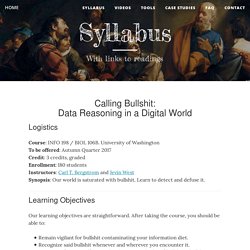
University of Washington To be offered: Autumn Quarter 2017 Credit: 3 credits, graded Enrollment: 180 students Instructors: Carl T. The Marshmallow Study Revisited. October 11, 2012 Delaying Gratification Depends as Much on Nurture as on Nature For the past four decades, the "marshmallow test" has served as a classic experimental measure of children's self-control: will a preschooler eat one of the fluffy white confections now or hold out for two later? The problem with general ability statements in history education – Clio et cetera. Progression models are frequently constructed from ‘ability’ statements. Put simply, if you have an ability, it means you can do something. It is therefore quite common to see progression models in history education containing statements saying “pupils can construct causal arguments” or “pupils can critique interpretations of the past”.
The rationale behind this is not hard to see. As a history teacher, I want my pupils to become more able in the discipline. Expert historians spend their time constructing causal arguments and critiquing interpretations, and it would therefore seem to follow that a progression model for history education ought to contain ability statements about these disciplinary practices. Preferred Reporting Items for Systematic Reviews and Meta-Analyses: The PRISMA Statement. SpecialisedPRISMA-Equity: Welch V, Petticrew M, Tugwell P, Moher D, O'Neill J, Waters E, White H; PRISMA-Equity Bellagio group. PRISMA-Equity 2012 Extension: Reporting Guidelines for Systematic Reviews with a Focus on Health Equity. PLoS Med. 2012;9(10):e1001333.
CV of failures: Princeton professor publishes résumé of his career lows. A professor at Princeton University has published a CV listing his career failures on Twitter, in an attempt to “balance the record” and encourage others to keep trying in the face of disappointment. Johannes Haushofer, who is an assistant professor of psychology and public affairs at the university in New Jersey, posted his unusual CV on Twitter last week.
The document contains sections titled Degree programs I did not get into, Research funding I did not get and Paper rejections from academic journals. It also includes Academic positions and fellowships I did not get and Awards and scholarships I did not get. Haushofer wrote that he created the document to “give some perspective”. Impartial journalism is laudable. But false balance is dangerous. Non Sequitur Comic Strip, January 20, 2016 on GoComics.com. It doesn’t matter what is in your hands – The Digital Stranger. Some strange things seem to be happening in the learning technology and T&L debates at the moment.
There appears to be a growing presence of an anti-tech resistance, challenging the efficacy of technology (and those who use it). “Hands-Off” Teaching: Conversation as Pedagogy in Library Instruction. Polis – The role of Emotion in the future of Journalism. SoTL Primer Top Ten. What does research-informed teaching (RIT) look like? Excellent teaching goes hand in hand with excellent research. This blog prepared by the Higher Education Academy (HEA) and University Alliance, ahead of its workshop event with senior university practitioners and key higher education stakeholders, explores the latest thinking on research-informed teaching and what it looks like. Diversity is a strength of our higher education sector – and research-informed teaching can vary widely. Promoting excellent teaching whatever its form enhances the student experience, improves student employability and enriches the research culture.
Six easy ways to tell if that viral story is a hoax. The Semmelweis Reflex: Why does Education Ignore Important Research? Making a game for a Library – Medium. Parents Of Nasal Learners Demand Odor-Based Curriculum. COLUMBUS, OH–Backed by olfactory-education experts, parents of nasal learners are demanding that U.S. public schools provide odor-based curricula for their academically struggling children.
Evidence Based Educational Leadership: The start of the school year and the return of the Zombies. Teaching ‘grit’ is bad for children, and bad for democracy. According to the grit narrative, children in the United States are lazy, entitled and unprepared to compete in the global economy. Making the First Day Matter – Cate Denial. The Difference Between Teaching and Telling by Adam Griffin on Prezi. Paulo Freire, critical pedagogy, and libraries. You’ve probably heard of #critlib: that loose affiliation of librarians interested in “critical perspectives on library practice” [link]. What’s the point of education if Google can tell us anything? More than you wanted to know about James Atherton. 6 tips for librarians to engage with their research community. The five biggest reading mistakes and how to avoid them.
Teaching and Learning. Games and gamification for information literacy. Adam Edwards & Vanes… The inquiry-based approach to higher ed that could prevent college students from dropping out. The menace of memes: how pictures can paint a thousand lies. The death of the digital native: four provocations from Digifest speaker, Donna Lanclos. Information literacy is for life, not just for a good degree. The Answers, The Questions and Practical Significance — Identity, Education and Power. Active Learning Is Not Our Enemy: A Response to Molly Worthen. Bad Education: Debunking Myths In Education: Amazon.co.uk: Adey, Philip Dillon, Justin Adey: Books. Burke's Parlor Tricks: Introducing Research as Conversation. HEA subscription fees to double for most universities. You may think you learn better in a certain way. You actually don’t. How to respond to learning-style believers. 12 Spectacular Acts Of Wikipedia Vandalism. The concept of different “learning styles” is one of the greatest neuroscience myths.
Student Engagement in Large Group Teaching (with images) · dave_thesmith.